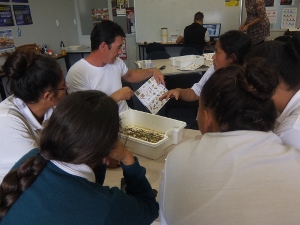
The science resources, developed by the House of Science, are part of a wider pilot project facilitated through Priority One’s Instep programme with funding from the New Zealand Lottery Grants Board to engage with Māori secondary school students.
The purpose of the Instep programme is to harness the energy and expertise from local business to inspire students to make informed career choices. Under the guidance of Instep Steering Group Māori business representative, Anaru Timutimu, the “Instep engagement with Māori” plan was developed. This has led to the development of Māori-led project, ‘Nga tikanga o te wai me te whenua’ with guidance from local iwi through Te Wharekura o Mauao, a Māori Medium school established by the three Tauranga Moana iwi and based in Bethlehem, Tauranga.
A review of demographic and labour predictions for the Bay of Plenty in 2014 suggests that by 2063, 25 per cent of the region’s population will be Māori – half of whom will be under 25 years of age. This compares with 14 per cent of the national population expected to be Māori by 2063. The recently released Bay of Plenty Tertiary Intentions Strategy notes: “In the Bay of Plenty, increasing engagement and participation of Māori youth in tertiary education is imperative to its social and economic success”.
The goal of the ‘Nga tikanga o te wai me te whenua’ project is for rangatahi (youth) to understand their potential and the application behind the science using a land, water and cultural context. As well as the two science resource kits, students undertake field trips to see first-hand the potential of science in the context of business and associated career opportunities. To date the students have visited Sanford’s fisheries operation and the University of Waikato’s Coastal Marine Field Station based at Sulphur Point, Tauranga.
“The students are at the centre of this project,” Instep manager Lyn Parlane says.
“The involvement of 38 Year 11 Te Wharekura o Mauao students and their teachers, Whaea Birney Ahomiro-Robinson and Matua Haydon Huriwai, has been a very important element in ensuring successful outcomes.”
The students are involved in the school’s Te Repo/wetland project, which began last year with the help of the Hawea Vercoe enhancement fund from the Bay of Plenty Regional Council.
The project uses the land and water as a medium for the achievement and identity to support the acquisition and revitalisation of Te Reo Māori. It also encourages students to develop as confident, connected and actively involved lifelong learners who are embedded in their culture.
Head of the Te Repo project Whaea Birney says they are fortunate to be working with the director of the House of Science Chris Duggan.
“She is passionate about science and is able to inspire rangatahi Māori to become budding scientists. By utilising the wetland, students can learn across a number of curriculum areas.
“Through analysing and comparing the opinions and educational experiences of the students, staff can discover the types of teaching practices that will maximise the engagement and learning for Māori students. The Te Repo project would not have been possible without the continued support from principal Koa Douglas, our board of trustees and colleagues,” Whaea Birney says.
“Working together with local iwi to develop these science resources has been a fantastic privilege,” Ms Duggan says.
“Students will be engaged in hands-on, inquiry-based learning with all the equipment provided for 11 different activities. We are looking forward to continuing our relationship with Te Wharekura o Mauao as we look to expanding the breadth of bi-lingual science resources available.”
The intention is to share the two Te Reo Māori science resources through the House of Science, which was established at Sulphur Point in 2013 to connect and resource the local science community. The key elements for this project will be prepared by Priority One’s Instep programme and be shared with local secondary schools involved in the Instep programme.
The much-delayed English draft curriculum is now out for consultation, generating discussion from teachers.
Research from AUT demonstrates arts, culture and recreation have positive impacts on all aspects of…
How effective has the school phone ban been in achieving its aims? Researchers from the…
School camps and excursions deliver hands on learning experiences, helping to consolidate classroom learning.
Innovations in AV technologies present new opportunities to engage with students. We look at how…
A new report from the University of Auckland’s Our Voices Project asks young people what…
This website uses cookies.